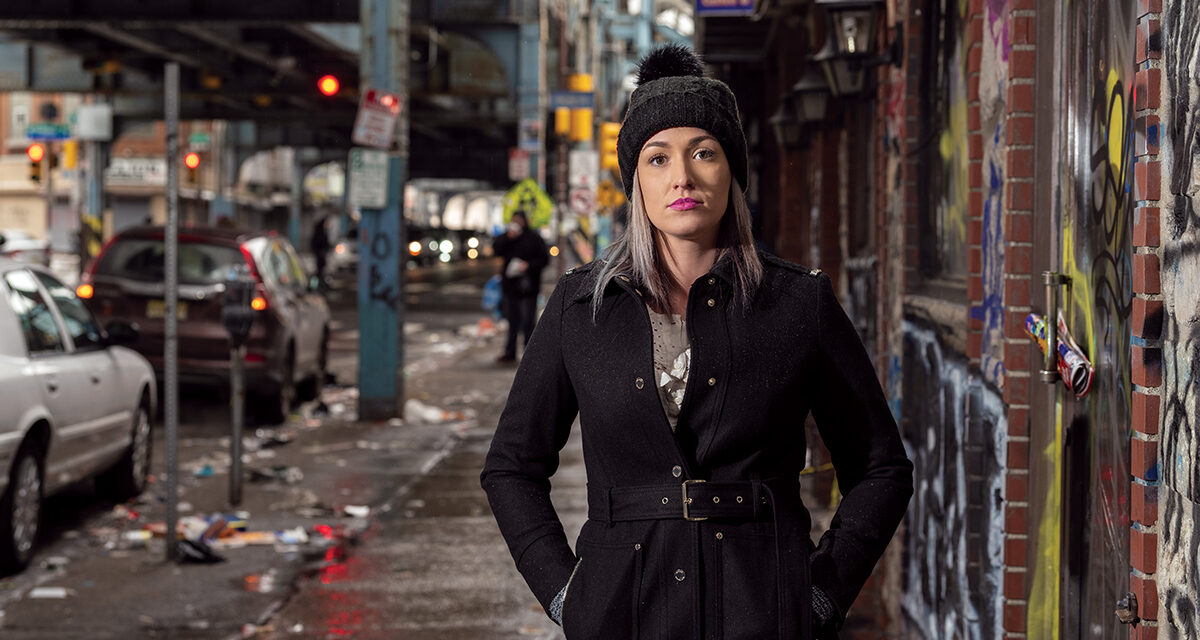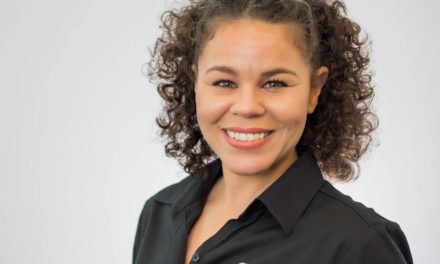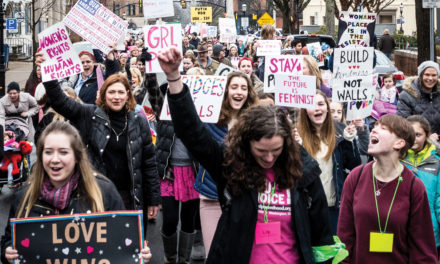After nearly a decade battling a drug addiction that left her estranged from everyone she loved, Megan Cohen started the Grace Project to help others still struggling on the streets of Philadelphia.
When she thinks back, the nights Megan Cohen spent in jail were almost a relief. Behind bars, she wouldn’t have to sleep on a street littered with needles and trash. She wouldn’t be soaked to the bone during a storm. She wouldn’t be starving or dying of thirst. She wouldn’t get robbed while she slept. And, at least on those nights, she wouldn’t use heroin or crack, no matter how much she wanted them.
The drug addiction that blossomed during her teenage years at Central Bucks South High School in Warrington, Pa. led her to a sinister and traumatic life on the streets. By the time she was 26, Cohen had been in and out of 71 rehab centers, spent four stints in jail totaling about 18 months, and lived homeless in shadowy parts of Miami, Detroit, Palm Springs, and the Kensington neighborhood of Philadelphia.
While she’d had rocky periods during her youth that involved self-mutilation and combative behavior, it’s a life her mom, Jennifer Shablin, couldn’t see coming until it was too late. “When Megan was a kid, I just knew she was going to do well at just about anything she tried. She was so smart, and she still is. We went from that and from Johns Hopkins University tracking her from 7th grade on because her national test scores were so high to hoping that she ended up arrested instead of dead,” says Shablin, just one of many family members whom Cohen lied to and stole from over the course of her addiction.
For nearly a decade, her need for drugs drove Cohen’s choices each day as she tried everything to numb herself from the pain and shame she felt. “I was a good kid growing up. I always had a good heart. But once I started using, all I could think about was that if I didn’t get money for my next drug, I was going to be sick. It’s an obsession,” she says. “I did things to get money that were not in line with who I am, whether that’s stealing from somebody, robbing my family, or lying. I would go into treatment, and when I would start feeling things again, I would run. That became my pattern. I wanted to shut my brain up and not face those things.”
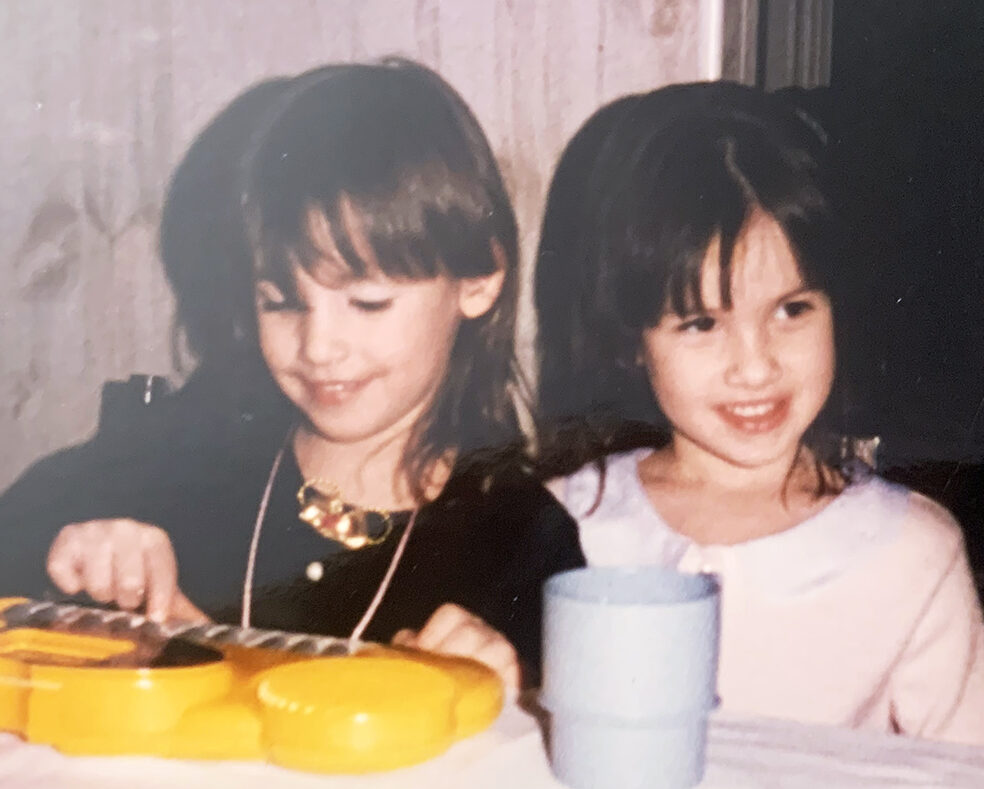
When Megan was a kid, I knew she was going to do well at just about anything she tried. She was so smart, and she still is. We went from that to hoping that she ended up arrested instead of dead.
The Truths About Addiction
1. Tough love and compassion matter.
The combination of my family’s tough love along with compassion and understanding from complete strangers was a big part of how I found my way. Your family can’t support your addiction, but it’s so important that you are always reminded that you’re worthy of love.
2. Rehab is not a magic wand.
When you’re drug-dependent, drug use often comes before basic survival, so that’s all that we think about. When you go into rehab, you can get removed from the drug, but the problem is something led us to drugs in the first place. You have to be willing to do the work and fully invest yourself in facing everything and dealing with the pain before you can sustain sobriety.
3. You will be an addict for the rest of your life.
Addiction is a disease of the brain, and it affects the way we think, and we will have those cravings for the rest of our lives. My job is to stay active in recovery and to stay focused on where I was, what happened in my past and having gratitude for my life today.
4. Sobriety is a total lifestyle change.
To be up for the challenge of getting sober, I had to change who I surrounded myself with, the way I thought, the way I acted—everything. A holistic approach to treating addiction means treating every aspect of ourselves for a total and genuine change. You have to address all the parts of you—the spiritual, emotional, and physical.
—Megan Cohen
A Lonely Road
Cohen’s drug use originated the way it does for so many addicts—with the combination of running from pain and the misconception that dabbling with drugs won’t hurt. What started with popping Percocet at high school parties soon morphed into heroin use, and before she knew it, she was in too deep to stop.
Her family noticed mood swings and evasive and dishonest behavior, and her older sister, Jocelyn Cohen, became increasingly worried. “One of our mutual friends told me Megan was using. I thought he was lying, that there was no way that she would be. I thought she was just going through a high school thing,” she recalls. “But it ended up being true, so I asked everybody not to give her gift cards or cash, just to see what would happen.”
Ultimately, in early 2011, Cohen told her mom that she was using and that she owed people money. By then, her mom wasn’t surprised, and while she understood that she needed to show some tough love, she still had deep faith that Cohen could get clean. “I asked her if she was ready to get help, and she said she was. But looking back, I think she said that because she wanted an immediate fix,” Shablin says. “She didn’t want to do the work that needed to be done. And the walls were closing in on her a little bit. That started a very long pattern of Megan being in and out of rehab.”
Cohen thought she could just go to rehab and stop using, but getting sober, she eventually learned, was going to take an act of will and determination she hadn’t yet tapped into. “I hadn’t been through withdrawal before, so when I tried to stop, I got so sick. I realized that if I just found ways to keep using, I wouldn’t have to feel bad. It started this cycle,” Cohen says. “I ended up getting arrested three times within a short period—twice for shoplifting and once for drug paraphernalia. I figured out that if I went to rehab, it would lessen the chances that I’d have to go to jail, so that’s what I did.”
Knowing she couldn’t support her daughter’s habit financially or by giving her shelter, she made it clear to her daughter that she still loved her but that she was on her own. So, Cohen spent the better part of her twenties in rehab centers, serving time in jail, or living on the street. “The streets are a very lonely place to be. As a young girl out there, you become an easy target for bad things to happen. That’s part of why I continued to keep rotting because things were happening that I didn’t want to face.”
In one case, Cohen remembers a man trying to keep her trapped in a hotel room and another man who choked her until she passed out. She was constantly finding herself in terrible situations, many of which she narrowly escaped.
But perhaps the worst part was the constant hunger and thirst. “I was literally starving. I remember one time when I was out in Kensington, a man all the way down the block from me opened a bag of barbecue chips, and I could smell it from where I was because I was so hungry,” she recalls. “The thirst is unbelievable, and when you don’t have running water, you feel disgusting—less than human.”
She had limited interaction with her family, and for long stretches, their only true recourse was to hope and pray that Cohen was alive and safe. “That was the toughest part—every night going to bed not knowing where she was, seeing odd numbers come up on my phone and thinking, Is this the police or a hospital? I’d lie there wondering if she was chained up in somebody’s basement. Was she being tortured? Everything goes through your mind. And, you really don’t have too many places to turn.”
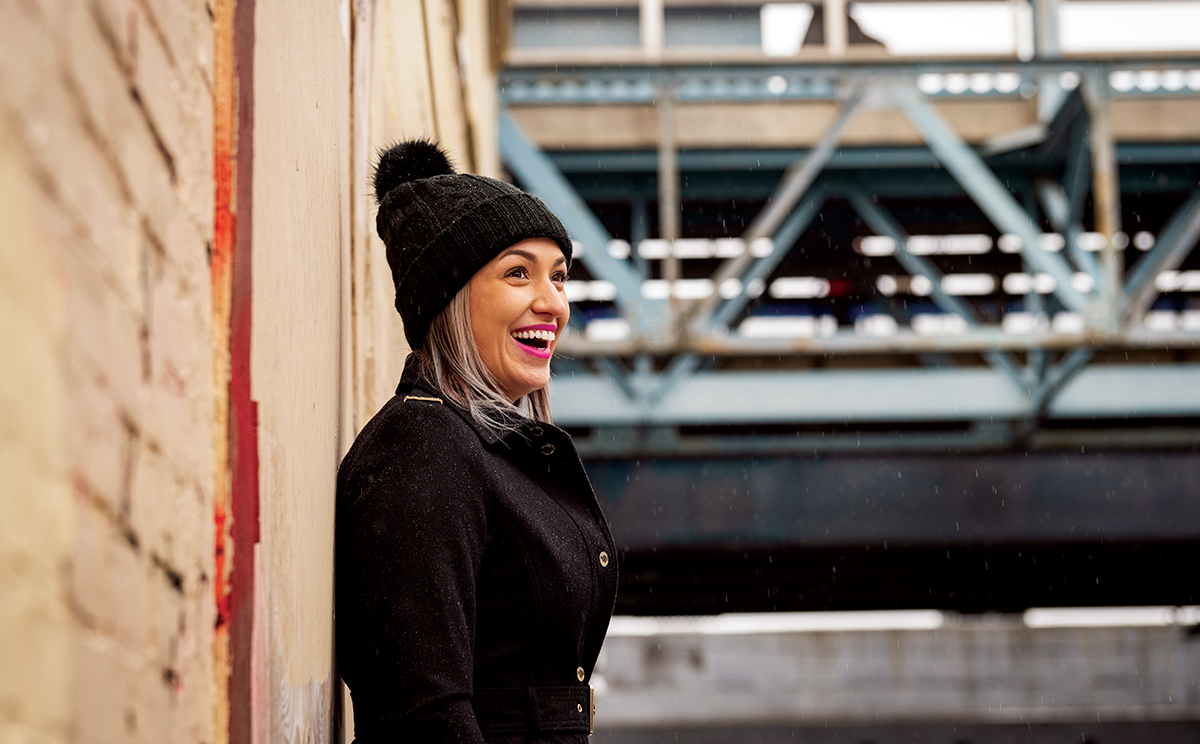
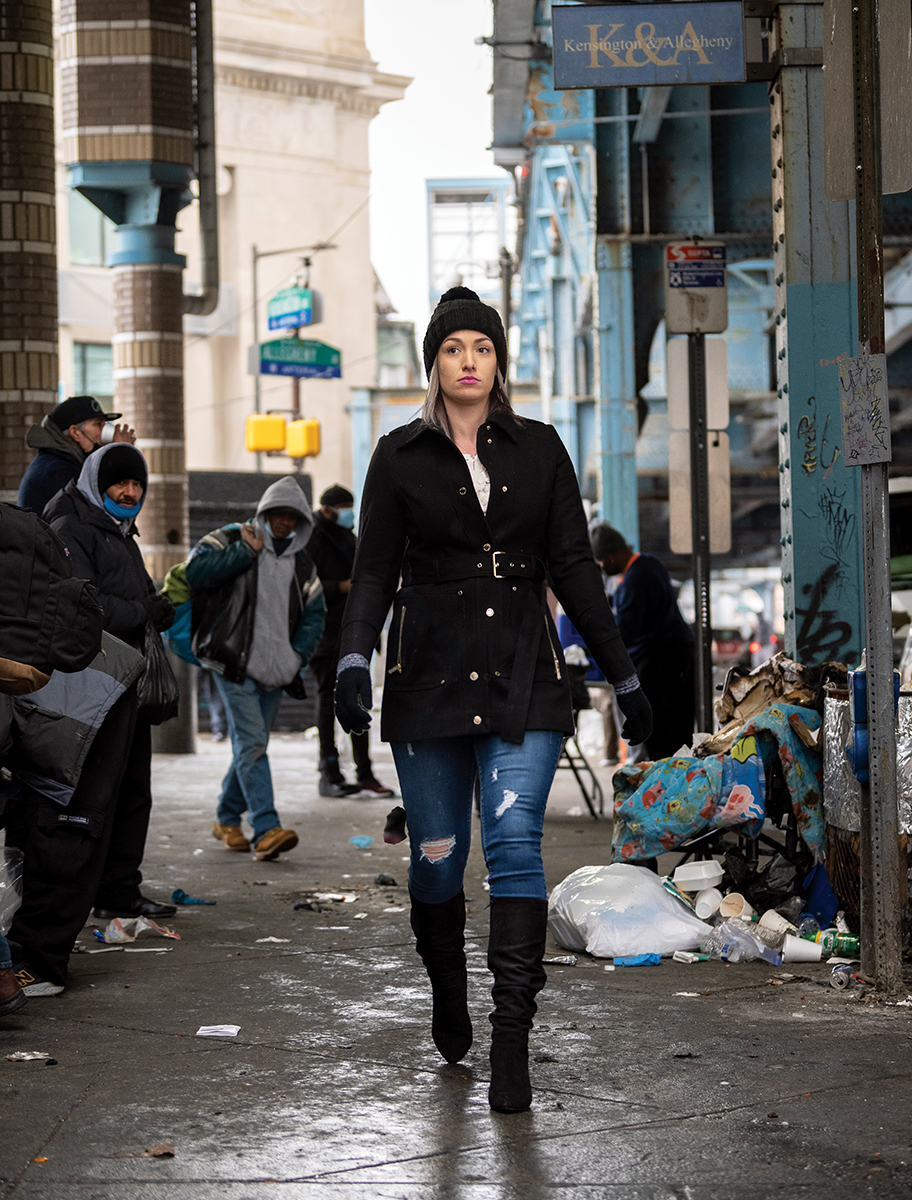
When you go into rehab, you can get removed from the drug, but the problem is something led us to drugs in the first place. You have to be willing to do the work and fully invest yourself in facing everything and dealing with the pain before you can sustain sobriety.
The Kindness of Strangers
While Cohen was struggling to survive on the streets in Kensington, there were several people—she calls them angels—who showed her small gestures of caring that made a huge difference. Among them was Joshua Santiago, an off-duty Uber driver who saw her walking in the rain down I-95, picked her up, and drove her to safety.
Later, there was a woman who Cohen says may have changed the course of her life for the better. “I was walking down the block that I was typically on, and this woman grabbed me. I turned around, ready to swing because I thought I was getting robbed,” she says. Another woman ran over and intervened to translate, telling her that this woman wanted to help Cohen. She thought didn’t belong there and offered to take her home for a shower, clean clothes, and food. “I was completely honest. I told her, ‘I’m on heroin and crack. I robbed my family. My family is done with me. I’ve been in and out of treatment centers. I have felony warrants out for my arrest. This is who I am,’” she says. “But she brought me home, and I showered and ate and got clean clothes. When I went to leave, she gave me a hug. When we pulled away, we both looked into each other’s eyes, and both of us started crying.
“I think of that as my big God moment. After that happened, there was no denying that was a direct answer to my prayers in the kindness that she showed me. I was like, Okay. I get it. I don’t have to live this way. Since then, I’ve had a sense of acceptance and peace, feeling like God is looking out for me.”
The next day, Cohen called home and asked her mom to pick her up, knowing she’d have to take her to the hospital and turn her into the police to answer for outstanding warrants. But Shablin recognized a change in her daughter something was different when Cohen reacted to this with understanding instead of anger. “I said, ‘Mom, I knew you were going to turn me in. You needed to. You did the best thing, and I totally understand,’” Cohen says. “‘I couldn’t bring myself to turn myself in. I needed you to do it.’”
Cohen spent 2 months in jail, which was the beginning of her sobriety. Shablin hired Cohen an attorney, and they initiated drug court, which kept her daughter from going to Pennsylvania State Prison, as long as she met their terms.
That was 20 months ago. Cohen hasn’t used drugs since.
Paying It Forward
Every day of Cohen’s sobriety has been hard-won. But after spending 2 months in jail, she returned to Livengrin, the Bensalem, Pa. drug treatment center where she’d spent the first of 71 stints in rehab nearly a decade before. Drug court had to convince the center to take her since Cohen was on a “do not readmit” list. At first, Cohen was petrified, afraid to let anyone get close, worried that she couldn’t stay clean, and scared to death to face the reality of what she’d been through. Ultimately, she decided to give rehab everything she had for all 90 days. By the time she left, she’d been clean for 6 months, and she didn’t look back. “From there, I went into a recovery house that was very structured, and I got an Alcoholics Anonymous (AA) sponsor. I started doing out-patient treatment along with AA, I went back into the gym, and I started watching what I ate. I also began to pray and take care of myself holistically—mind, body, and spirit.”
For her part, Shablin was still haunted by what she saw on the Philly streets. After years of mentally separating her daughter from the other drug addicts and homeless people, she eventually realized that each of these people was somebody’s daughter, somebody’s son, or somebody’s sister. She decided to return to Kensington to see what she could do to help, and Cohen was determined to go with her.
With support from her family, Cohen created the nonprofit Grace Project, which delivers hope through small acts of kindness. Each Thursday, they deliver food, clothes, and supplies to people living on the streets of Philadelphia, specifically the Kensington streets that where Cohen struggled to survive. They pick up trash. They offer a smile. They remind addicts they are still human beings. “When I would go down to look for my daughter, I would watch these people come out in the summertime and pour water into the mouths of addicts and homeless people who were slumped over in the street. They would wake them up and pour a little bit of water in their mouths, and they’d go on to the next one. And I know one of those people they helped was my daughter,” Shablin says. “That’s why we do the Grace Project. We try to give people hope. We don’t force anything. We give them a hot meal every week and clothes to keep warm and let them know that we’re here. And we’ll be back next week. And the week after that. And that’s something. Sometimes, it’s everything.”

